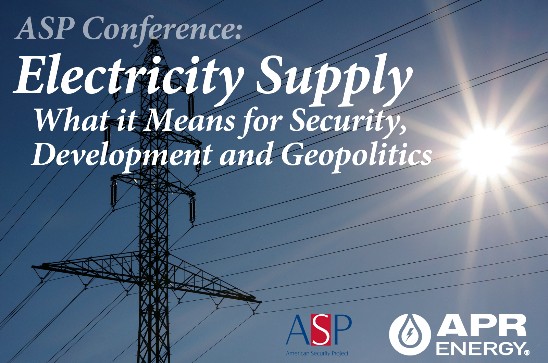
Electricity Supply: What it Means for Security, Development, and Geopolitics
The nexus of electricity, development, and security is significant, yet its nuances are too often overlooked. American Security Project’s half-day conference on November 19th, “Electricity Supply: What it Means for Security, Development, and Geopolitics,” brought together development and energy experts, government officials, business leaders, and policy makers to better establish these important linkages, share successful implementation strategies and consider how these successes can be replicated in diverse contexts.
A reliable energy supply enables more effective food cultivation and storage, illuminates spaces for educational and commercial activity, and supports the deliverance of other essential services. When these capabilities are consistent, economies and the communities they support have the opportunity to flourish. Consistent power generation and distribution also bolsters security efforts simply by being dependable, whereas rolling blackouts contribute to turmoil and general instability. Rural and other communities that are outside the scope of traditional grid systems are particularly vulnerable and in need of solutions better suited to their needs. The Conference examined these relationships in greater detail, focusing particularly on the impacts of accessible power in diverse contexts, the risks to generating and distributing that energy and models that successfully mitigate those concerns.
Panel one, “Electricity: The Catalyst for Change,” examined the foundational role of electricity for sustainable development and security. The second panel, “The Challenges of Generating and Delivering Electricity” assessed the barriers to electricity posed by poor governance and instability and the work being done to mitigate these risks. The concluding panel discussed strategies successfully delivering electricity across diverse environments.
In Brief
· Energy, development, and security are inextricably linked to one another- especially in rural and other communities without access to a traditional power grid system.
· While existing security concerns, governance challenges and general instability present real barriers to the generation and distribution of power, the absence of reliable energy creates greater risks.
· “Fast-track” models and similar micro-grid systems are viable solutions for communities passed over by traditional grids and must be part of the solution for previously electrified areas.
· Going forward, policy makers will need to consider new and diverse technologies to generate and distribute power
Electricity Supply – Security Development Geopolitics







[…] relationships with India and Afghanistan, the “youth bulge” in the population, the need for reliable electricity to spur development, to Pakistan’s nuclear capabilities, China’s influence through investment and opportunities for […]